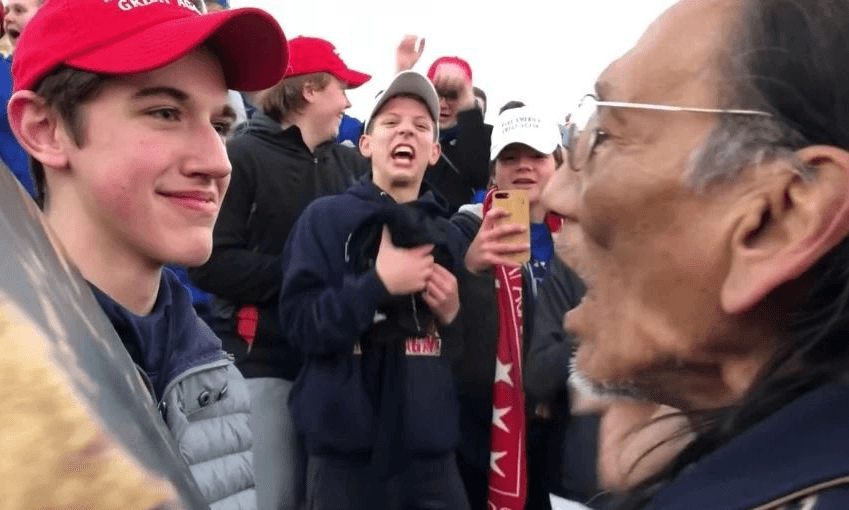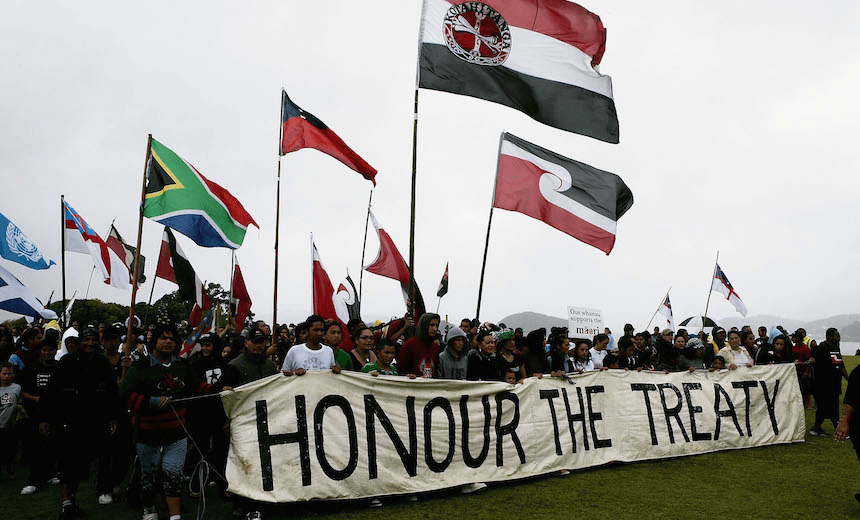I had the privilege to stand alongside Mātua Nathan and his daughter Alethea in New York last year, writes Julia Amua Whaipooti. Now is a moment of progressive global outrage. It will pass, but his work will not.
On April 20 last year I was sitting in the General Assembly at the United Nations when I met mātua Nathan Phillips and his daughter Alethea. There were hundreds of indigenous people who had travelled from all over the world for the chance to have three minutes to speak to the UN. We were just a few of them. I was there as a part of a rōpū of young Māori to continue the campaign against our government building a mega prison that would lock up heaps of Māori. Mātua Nathan is a water protector and he brought his daughter as the voices for all those fighting at Standing Rock.
The place was daunting. There was a panel at the front of important people (the UN), suits of government reps (who were paid to be there) occupying half the room and with guaranteed speaking time, and indigenous people from all over, who spoke different languages trying to navigate this foreign, Western place. We were all vying for the three minutes. “Indigenous issues” not “indigenous people” were the priority in that forum; we could not whakawhanaunga here. Instead we were competing against each other for the chance to speak.
Whether you got to speak was determined by lists that were put on the wall at the start of each session. We learnt pretty quickly that unless you were in the top 30 you were probably not going to get the chance. I would see kuia and kaumātua from different places look at the lists with tears or strained relief that they might be ranked high enough. It was stressful and hard to see past your own hopes to raise your “own” struggles. Many indigenous people did not get to speak, and many never returned.
It came to the last half hour of the final session, where I thought it would be my last chance to speak, when I realised I wouldn’t get on. I was sitting in this giant room, with a huge sense of failure, that I had let so many people down back home. I was struggling to see past this and my ears fell deaf to the room. Then Alethea Phillips started speaking, repping nga iwi from Standing Rock. This young wāhine, carrying the weight of all her people. When her voice broke and she was silenced for a moment, my ears woke up and my natural instincts kicked in. I stood up, walked across the room followed by our rōpū of young Māori to stand silently behind her and mātua Nathan so they knew they weren’t alone. Their struggle was ours and we were with them. Reflecting on this, in light of the video of mātua Nathan in the face of white supremacy, I’m struck by the knowledge that our ability just to be and to express ourselves as indigenous people is a shared struggle.
The fact that this moment has been caught on camera has elevated mātua Nathan’s platform to be heard worldwide. After the UN forum, I had the privilege to speak with him in New York over kai, and hear his life’s commitment to the rights of his people, the rights of indigenous people.
Now is a moment of progressive global outrage. It will pass, but his work will not.
The issue isn’t actually about the actions of these white, young, Catholic boys who attempted (and quite comfortably so) to silence a peaceful march and expression of culture. They are a product of a colonised world, where white supremacy is normalised. Chanting “build the wall” to an indigenous elder as if indigenous people should be blocked from entering the land they come from expresses an ignorance that has been tolerated and nurtured forever. We do it here in Aotearoa too – you just need to read Stuff comments to see how New Zealanders are chanting their own version of “build the wall” on the daily.
The truth is, we live in a world that forces us to exist in colonised spaces. Just as at the UN, where the natural environment was to compete with each other, the question is how we exercise solidarity as indigenous people. Do we compete, or do we support each other in our common but different experiences of colonisation? Standing on the stage at the Global Assembly in that moment was one expression that felt right. But what does solidarity look like every day when we must struggle just to be?
Julia Amua Whaipooti (Ngāti Porou) is a member of the Independent Justice Advisory Group, board member and spokesperson for JustSpeak, and senior advisor at the Office of the Children’s Commissioner





